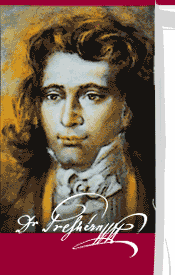| |
|
|
| 1830 |
Matija Čop returns to his homeland |
|
| |
|
|
 |
n the other, 'poetic' part of his life,
important events began to take place. Matija
Čop, perhaps the most educated Slovene of the time,
finally returned to Ljubljana and started socialising
a lot with Prešeren. Čop's exceptional theoretical knowledge
and above all his clear viewpoint on the need for the
development of literature in Slovene were well matched
to Prešeren's poetic talent and his wish for the Slovene
language to become a more cultured means of expression,
so that the Slovenes could take their place alongside
the Germans and other nations. The Carniolan duo found
a winning formula together. Needless to say, there were
many obstacles to be overcome, from the backward Jansenist
thinking in the area of spiritual matters, as advocated
by the clergy, to police control and terror in the area
of state policy, as maintained by Metternich's absolutist
regime. Following Čop's advice, Prešeren began to introduce
Romanic poetic forms, he started writing in tercets and
stanzas; he also wrote his first sonnets and thus opened
up new horizons for Slovene poetry. More and more new
poems appeared, and so the idea of publishing an anthology
of Slovene verse began to emerge. In 1830 there appeared
the first edition of Kranjska čbelica (there were to be
a further four), containing many of Prešeren's poems.
This publication became the principal platform for Prešeren's
work. The poetic fruit of Prešeren's friendship with Čop
is represented mainly by the elegy Slovo
od mladosti (A Farewell to My Youth), the Ljubezenski
sonetje (Love Sonnets) and the satire Nova
Pisarija (The New Writing). In this last poem, the
poet brilliantly pours scorn on the current predominant
teachings, according to which poetry was to be educational
and utilitarian, as well as on the advocates of such teachings.
The battle between the freethinkers and the traditionalists
intensified, Prešeren in particular became increasingly
sharp, so that the censor's office had to become more
active. Even his mentor, Čop, had to hold Prešeren back,
which was not to the poet's liking. When the third edition
of Čbelica was being prepared Čop, relying on his reputation,
managed to persuade the authorities in Vienna to allow
him to be the one to check the texts to be published and
thus the two men came into conflict. Čop wanted to calm
things down and removed the poem Apel
podobo na ogled postavi (When Apelles Exhibits his Painting)
in which Prešeren told Kopitar that "a Kopitar should
only judge shoes" (in Slovene, the word 'kopitar', in
addition to its other meanings, can also be used to refer
in a derogatory way to a shoemaker. Translator's note.).
The poet was very upset by this and he wrote an angry
letter to Čop. Later he apologised. The reasons for Prešeren's
rash actions and occasional periods of despondency when
he had no faith in the quality of his poems, should be
looked for in his professional life. His unpaid work as
an apprentice in various state offices did not bring the
desired result; his superiors, even though pleased with
his work, rejected his appeals for financial assistance;
in addition it seemed that he would never get a permanent
post. Thus Prešeren was forced to give up his career as
a state employee; he got a permanent post as an apprentice
legal clerk in Dr Baumgarten's office instead. The next
big trial for Prešeren and Čop was the alphabet battle.
Kopitar and his student Metelko tried to introduce a new
alphabet, or rather twelve new letters, for which there
were no grounds either in terms of substance or aesthetics.
Prešeren eagerly participated in the battle with his famous
sonnet about the spelling of the word kaša, whilst the
more diplomatic Čop remained silent. The Czech poet Čelakovsky
spoke in his place, rejecting the alphabet reform and
at the same time, in his review of the first three volumes
of Kranjska čbelica, praising Prešeren's poetry. This
was the first favourable review from abroad, and it increased
the confidence of the insecure poet. Following this Čop,
encouraged by Čelakovsky, firmly attacked the new alphabet,
which was soon after banned by court decree.
|
|
| |
|
|
| |
|
|
   |
|
|
|
|


